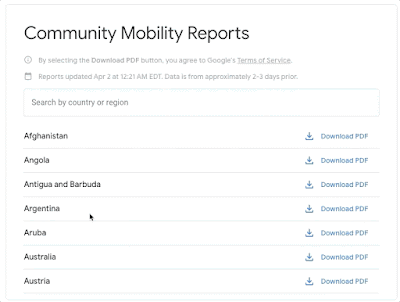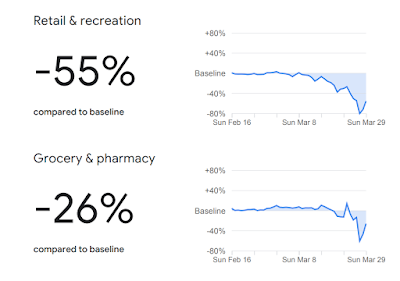مساعدة مسؤولي الصحة العامة على مواجهة فيروس كورونا المستجد (كوفيد 19)
في هذه الأوقات الاستثنائية التي تستدعي استجابة المجتمعات في جميع أنحاء العالم إلى جائحة فيروس كورونا، ازداد التركيز على استراتيجيات الصحة العامة مثل تدابير التباعد الاجتماعي بهدف التخفيف من وتيرة انتشار الفيروس.
ونستخدم على "خرائط Google" بيانات مجمعة ومجهولة المصدر توضح مدى ازدحام أنواع معينة من الأماكن، ما يساعد على تحديد أوقات وجود عدد كبير من الناس في الأنشطة التجارية المحلية. وبحسب مسؤولي الصحة العامة، يمكن أن تساعدهم البيانات هذه في عملية اتخاذ القرارات الحاسمة لمكافحة انتشار فيروس كورونا.
التقارير حول التنقلات في المجتمع
بدءًا من اليوم، سننشر إصدارًا أوّليًا من التقارير حول التنقلات في المجتمع أثناء انتشار فيروس كورونا لتقديم إحصاءات حول التغييرات التي حصلت بعد تطبيق إجراءات وقائية بهدف الحد من انتشار الفيروس، ومنها العمل من المنزل والبقاء داخل المنزل. وتم إعداد هذه التقارير لتكون مفيدة بدون المساس ببروتوكولات وسياسات الخصوصية الصارمة التي نتبعها، وستتم إتاحتها للعديد من البلدان حول العالم بما في ذلك مصر والأردن ولبنان والمملكة العربية السعودية والإمارات العربية المتحدة، وسيتوفر على الموقع الإلكتروني المزيد من التقارير التي تشمل بلدان أخرى. تستخدم التقارير بيانات مجمعة ومجهولة المصدر لتسجيل التغيرات في اتجاهات التنقل بمرور الوقت حسب المنطقة الجغرافية وفي فئات متعددة من الأماكن، مثل أماكن البيع بالتجزئة وأماكن الاستجمام والترفيه ومحلات البقالة والصيدليات والحدائق ومحطات النقل العام وأماكن العمل والأماكن السكنية. وسنعرض الاتجاهات على مدار عدة أسابيع وسنقدّم أحدث المعلومات التي تعكس الوضع قبل 48-72 ساعة، إضافةً إلى النسبة المئوية للزيادة أو التراجع في عدد الزيارات، إلاّ أننا لن نشارك العدد المطلق للزيارات.
ولحماية خصوصية المستخدمين، لن تتوفر في أي وقت معلومات تحدد هوية الأفراد، مثل مواقعهم الجغرافية أو تنقلاتهم أو جهات الاتصال. سننشر هذه التقارير عالميًا ونغطي مبدئيًا 131 دولة. ونظرًا للحاجة الملحة لهذه المعلومات، سنقدم أيضًا إحصاءات على الصعيد الإقليمي حيثما كان ذلك ممكنًا. وسنعمل في الأسابيع المقبلة على إضافة بلدان ومناطق لضمان بقاء هذه التقارير مفيدة لمسؤولي الصحة العامة حول العالم الذين يريدون حماية الأفراد من الإصابة بفيروس كورونا.
بالإضافة إلى الموارد الأخرى التي قد يمتلكها مسؤولو الصحة العامة، نأمل أن تساعدهم هذه التقارير في عملية اتخاذ القرارات المتعلقة بطرق إدارة جائحة فيروس كورونا، فيمكن مثلاً أن يستعين المسؤولون بها لزيادة معلوماتهم حول التغييرات في الرحلات الأساسية، ما يساعدهم على منح توصيات بشأن ساعات العمل أو إبلاغ عروض خدمات التوصيل. وقد تشير كذلك الزيارات المستمرة لمحطات النقل العام إلى الحاجة إلى إضافة الحافلات أو القطارات من أجل السماح للأفراد الذين يتنقلون بالحفاظ على مسافة كافية من الآخرين تحقيقًا للتباعد الاجتماعي. وفي نهاية المطاف، فإن معرفة ما إذا كان الأفراد يتنقلون وفهم أنماط هذه التحركات يمكن أن يساعد المسؤولين في وضع إرشادات لحماية الصحة العامة ولتلبية الاحتياجات الأساسية للمجتمعات.
حماية الخصوصية
تستخدم تقارير التنقلات في المجتمع تقنية إخفاء الهوية العالمية نفسها التي نستخدمها في منتجاتنا كل يوم، وبالتحديد الخصوصية التفاضلية، ما يشوّش مجموعات البيانات ويتيح الحصول على نتائج عالية الجودة بدون تحديد هوية أي فرد.
يتم إنشاء الإحصاءات بواسطة مجموعات بيانات مجمعة ومجهولة المصدر من المستخدمين الذين قاموا بتفعيل إعداد سجل المواقع الجغرافية الذي لا يكون مفعلاً تلقائيًا، ويستطيع المستخدمون الذين فعّلوا هذا الإعداد اختيار إيقافه في أي وقت من حسابهم على Google، ويمكنهم دائمًا حذف البيانات المسجّلة مباشرةً من المخطط الزمني.
إننا نمر بظروف ذات أبعاد لم يسبق لها مثيل وسنواصل تقييم هذه التقارير في ضوء التعليقات والآراء التي يشاركها معنا مسؤولو الصحة العامة ومجموعات المجتمع المدني والحكومات المحلية والمجتمع ككل، ونأمل أن تكون هذه الإحصاءات مفيدة ومكمّلة لمعلومات الصحة العامة الأخرى التي ستساعد الناس والمجتمعات على البقاء بصحة جيدة وبأمان.


